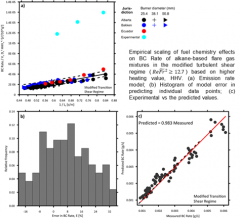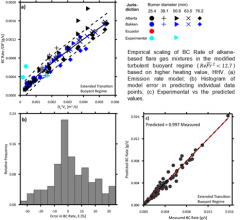Carleton University Mechanical and Aerospace Engineering graduate student Parvin Mehr has successfully defended her thesis entitled, Experimental Modelling of Black Carbon Emissions from Gas Flares in the Oil and Gas Sector. Parvin’s research was focused on predicting black carbon (BC) emissions from flares through an improved understanding of the coupled influence of aerodynamic and fuel chemistry effects. Through extensive experiments on vertical flames at Carleton University’s Flare Lab, Parvin was able to develop new, phenomenological correlations for flare BC emissions that could be explained in terms of macro flame dynamics. Two distinct flame regions were identified, with independent correlations for each. For the “transition-buoyant regime”, BC emission rates were scaled with the flare volume flow rate and the mean carbon number of the fuel. For the “transition-shear regime”, soot emissions were scaled by the effective mixing rate in the flame, with higher heating value emerging as a better parameter to scale different fuel compositions. These models were able to predict soot emission rates within ±35% over the range of conditions for methane-dominated flare gas mixtures presented in this thesis.
This represents a significant milestone accomplishment as part of FlareNet’s overall research objectives to develop predictive models for flare emissions that can be used to improve emissions inventories, standards, and regulations, while supporting mitigation. The importance of this work was recognized by industry and government representatives at the recent PTAC Methane Emissions Reduction Forum, held on Nov 4-5, 2020, where Parvin and recent Ph.D. graduate Bradley Conrad teamed up to win first place in the student research poster competition with a contribution entitled, “Predicting Black Carbon Emissions from Unassisted Vertical Stack Flares”. All of EERL’s and FlareNet’s research posters for the conference can be found here. The entire FlareNet team and the Energy Emissions Research (EERL) at Carleton University are proud to congratulate Parvin on her research success!

